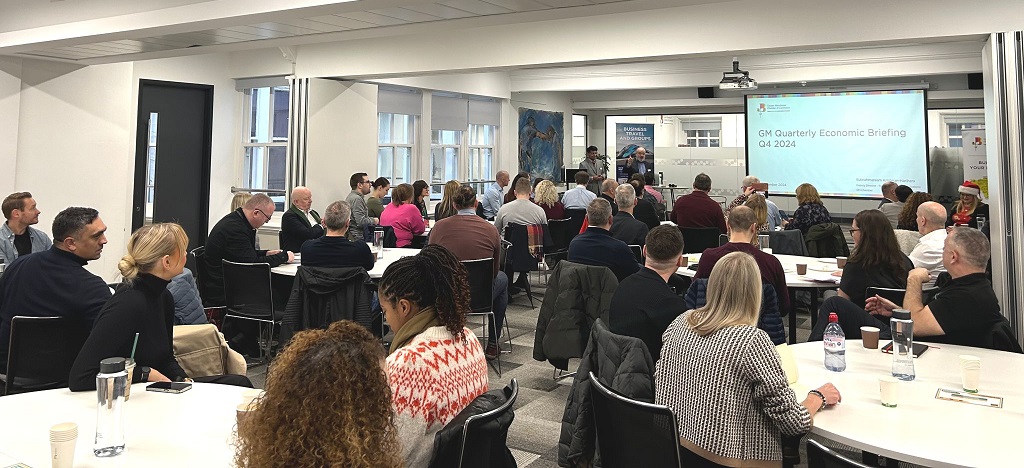
Greater Manchester Chamber of Commerce’s Q4 Economic Review was the most well-attended since September 2023, with businesses eager to hear the latest data on the economy.
Subrahmaniam Krishnan-Harihara, Deputy Director of Research at the Chamber, gave an overview of the latest Quarterly Economic Survey (QES). He explained that the results present a mixed picture. Demand from customers both in the UK and overseas showed improvements in this quarter although business confidence dipped. Overall, the GM Index, the QES based composite economic indicator, showed an improvement in Quarter Four.
In Quarter Three, the GM Index was 18.3 which was a noticeable slowdown relative to Quarter Two. Consumer confidence dipped in September after six months of improvement and there was a sharp decline in some areas. The GM Index now stands at 27.0 with improvement in both domestic and international demand. The QES results shows both domestic and international sales and orders went up in Quarter Four, with manufacturing, services and construction all seeing rising demand. But overall confidence took a knock.
He said: “Since September there has been a slew of publications from the Government plus the Budget, which did not get a good reception, and the fear of tariffs following the election of Donald Trump in the US. There has been two consecutive months of economic decline with inflation up to 2.6%.
“The QES results show manufacturing confidence slumped after the Budget. There was a decline in recruitment and the number of vacancies with employers now looking at higher costs after April especially following the hike in NICs announced at the Budget. That is the context for the QES. There was a drop in confidence about turnover and profitability but the rest of the QES measures are quite mixed.”
Subrahmaniam added: “Overall the service sector is fairly stable, which is key as it contributes over 80% of the UK economy. The figures for retail sales show people are paying much higher prices but are consuming less. They are paying more for less – that is the impact of inflation. The last few months have shown that behaviour is extremely important. If the messages coming from ministers continue to focus on making tough decisions, consumer confidence will dip.
“When it comes to international trade, the import and export of services are creeping up but there are challenges in the export of goods. The long-term trend for EU exports is a slight decline. The impact of Brexit continues and some smaller exporters have given up because the paperwork is getting too complex for small companies. There are 16,500 businesses across the UK that have given up exporting.”
The QES showed concerns about inflation remain, with many businesses saying it is their number one concern driven by expected rises in pay. Concerns were also raised about competition, taxation, business rates and exchange rates.
“Greater Manchester is an outlier in this and other quarters,” Subrahmaniam said. “Greater Manchester is the power in the Northern Powerhouse. It is a strongly performing economy and shows the contrast in performance between the UK’s city regions and the towns and rural areas.”
The presentation of the Quarterly Economic Survey results was followed by a panel discussion featuring Subrahmaniam, Chris Jackson, Managing Director of TransPennine Express; and Susana Córdoba, Head of International Trade at Greater Manchester Chamber of Commerce.
Chris Jackson discussed the challenges and opportunities facing TransPennine Express and the rail network in general, including skills shortages. He said: “When we get it right we can be a real driver of economic growth. Following the timetable changes, we’re now seeing record-breaking growth.”
He highlighted the TransPennine Route Upgrade which will deliver a 43-minute journey time between Manchester and Leeds on cleaner and greener trains, saying it would be transformational and equivalent to the Cross Rail of the North. He added that TransPennine Express aimed to address skills shortages, reduce the taxpayer subsidy it receives and increase diversity.
Susana said the UK was still at pre-Brexit levels of trade and the EU remained the country’s largest market. She highlighted how the Enhanced Trade Partnership aimed to provide a more seamless export journey for companies in Greater Manchester.
You can read the Quarterly Economic Survey (QES) report here.

